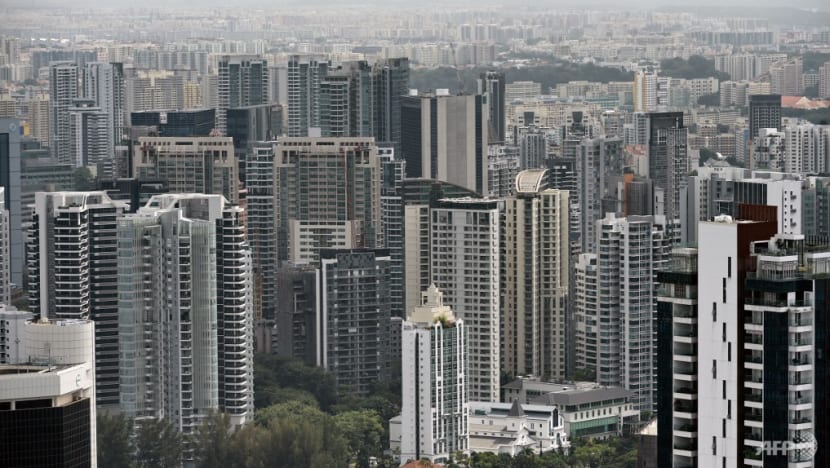Singapore property stocks hit by latest round of cooling measures
Property developers that have limited exposure to the residential market are likely to be less affected, say analysts.

A general view of the private residential prime district near Orchard Road in Singapore. (File photo: AFP/Roslan Rahman)
SINGAPORE: Property stocks in Singapore took a hit on Thursday (Apr 27) after the government announced increased additional buyer’s stamp duty (ABSD) for residential properties.
Shares of City Developments fell as much as 6 per cent from Wednesday’s closing price, while UOL slipped 5.29 per cent at session lows.
Real estate agencies PropNex and Apac Realty dropped 6.51 per cent and 7.63 per cent.
The broad Straits Times Index dipped 0.69 per cent earlier in the day but closed 0.36 per cent lower.
The government announced late on Wednesday night that foreigners will have to pay 60 per cent ABSD on any residential property they buy, doubled from 30 per cent.
For Singapore citizens buying their second residential property, the ABSD was raised from 17 per cent to 20 per cent. Those who buy a third one will have to pay 30 per cent ABSD.
This is the third round of cooling measures since December 2021, when the ABSD raised for housing developers as well.
Commenting on the declining stock prices of property developers, Mr Gary Ng, a senior economist at Natixis Corporate and Investment Banking, said “a cooled real estate market can dampen (the) profit outlook”.
“Many Singaporean developers have wide coverage in different property sectors, and those who are less diversified and have a bigger focus on the residential market may face more pressure,” he said.
Mr Ng added that there could be more headwinds ahead for property firms in Singapore because the hike in ABSD for foreigners is “massive”.
Minister for National Development Desmond Lee said last September that foreigners accounted for around 3 per cent of private housing transactions in 2020 and 2021.
OCBC Investment Research said it anticipated that property stocks would slip, although CapitaLand Investment would be “relatively unscathed” because it does not have direct exposure to the Singapore residential market.
CapitaLand fell 2.06 per cent during Thursday's trading session.
“We expect a negative knee-jerk reaction to the share prices of developers with material exposure to the Singapore residential sector,” OCBC researchers wrote in a note on Thursday.
Transaction volumes of developers could be affected by the latest measures, they added.
Sell-through rates – the percentage of units sold out of units launched – are likely to fall as developers would be reluctant to lower their asking prices too significantly because of high costs.
Sales volumes may also be adversely affected if developers delay their launches.
DBS Group Research analysts also said there may be delays in the launch pipeline, “especially when the near-term buying sentiment will likely be curbed somewhat”.
That said, DBS analysts noted that the share prices of property developers are already very low.
“This means that any drop is unlikely to be sustained, in our view,” the analysts wrote.


















